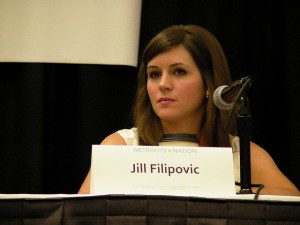
Jill Filipovic (via Flickr.com)
Radical feminist writer Jill Filipovic is not happy with Pope Francis. In the New York Times, she criticizes his recent announcement authorizing priests to forgive repentant confessions of abortion:
[M]ercy may actually be worse. While the pope’s announcement has been hailed as evidence of the church’s new, softer approach, it’s actually the latest example of the modern anti-abortion strategy: Portray women as victims who need to be protected from themselves with laws that restrict abortion rights.
Despite the concern for what the pope calls an “agonizing and painful decision,” research shows that a vast majority of women who terminate pregnancies in the United States don’t actually feel bad about it. In surveys, nearly all say it was the right thing to do, and positive feelings of relief or happiness outweigh negative feelings of regret or guilt for more than nine in 10 women, even years after the procedure.
Wrong. As Live Action regulars have known for a long time, this talking point requires fixating on reports of relief immediately following abortion and deliberately ignoring scores of studies finding substantially raised risks of clinical depression, psychiatric illness, substance abuse, and attempted suicide over longer periods of time.
Instead of treating women as adults who make their own decisions, the pope condescends to “all the women who have resorted to abortion,” saying he is “well aware of the pressure that has led them to this decision.” The threat of excommunication, at the very least, makes the church’s views on women’s rights clear.
Offering forgiveness is a softer version of the same judgment: that the millions of women around the world who have abortions every year are sinners. Inviting women to feel shame and guilt for their abortions isn’t a mercy; it’s cruelty.
No mention, of course, of the cruelty inherent in having your son or daughter killed. Filipovic’s entire rant is a farce for the same sin of omission we see here again and again and again and again: assuming abortion’s ethical correctness is a given, refusing to reference who it harms (or how) in any way, and constructing an entire narrative on the fiction that it is only controversial due to notions of purely-subjective morality.

Amanda Marcotte
I never thought I’d be saying this, but this is actually a lower caliber of abortion argument than the Marcotte standard. At least she accounts for abortion’s victims by lying about them; Filipovic just ignores them. It’s like trying to argue the Civil War was all about the cotton industry without mentioning that people were enslaved to do the work.
This sort of thing is bad enough when it corrupts secular abortion conversations; it’s particularly unserious when trying to critique a religious one. The Bible is unambiguous that all humans bear the image of God, and that to shed their innocent blood is intolerable. Jesus Christ affirmed that murder is non-negotiable, and particularly stressed that God “is not willing that any of these little ones should perish.” Accordingly, Catholicism has taught for nearly 2,000 years the “unchangeable” moral truth that as the destruction of a “human being [which] must be recognized as having the rights of a person,” abortion “is gravely contrary to the moral law.”
Filipovic is, of course, free to disbelieve Catholicism, but she is not free to pretend a religion can just casually dismiss its core tenets. Nor is it serious to whine that it’s somehow demeaning for a religion to hold that sins require forgiveness.
Even apart from abortion’s particular evil, that’s what religion is: a comprehensive set of standards, some of which pertain to personal morality, adherents believe God has set for them. Most religious people recognize that we fall short of our faiths’ expectations in various ways, but we’re well-adjusted enough to handle it with balanced introspection, not use it as a self-centered excuse to cry victim and pretend we’re infallible.
Moreover, we’re mature enough to keep things in perspective and live in harmony with people of different faiths who disagree on what those standards should be and sometimes find us lacking. To quote Jewish conservative pundit Michael Medved from his book Right Turns: “As long as Christians don’t treat me like hell in this world, or do anything to hasten my entry into the next world, why should I worry? If they don’t insist that I accept their theology as the price of cooperation, how dare I insist that they accept mine?”
Filipovic continues:
But women primarily feel guilty when they experience stigma and a lack of support for their choice. In telling women that they can be forgiven during this one year, the pope plays on the ambivalence and embarrassment that can come from silence around abortion. He sends the message that Catholic women, who, according to surveys have abortions at roughly the same rate as non-Catholic women, should feel ashamed.
Next in the list of things Filipovic doesn’t understand about religion: God’s will is not defined by popularity contests. The Bible is full of stories of God’s people rejecting His word and it turning out badly. Catholics forgetting those passages and defying Catholicism on abortion is certainly a problem for the Church in terms of how well they’re getting their teachings across, but in no way does it suggest the theology means something other than what it says, or may be jettisoned.
According to the mercy narrative, entirely normal and common reproductive choices are actually tragedies in which women are ignorant dupes manipulated by doctors or unsupportive partners […] The anti-abortion movement’s refashioning of women seeking abortions from selfish tramps to weak-willed victims has been an effective move.
So we can’t ever hold abortion seekers accountable for what they do know about killing their baby, but we can’t give their motives the benefit of the doubt and allow that they don’t know, either (which, given the massive pro-abortion propaganda disseminated by Planned Parenthood and its political, educational, and media allies, doesn’t take a “weak-willed dupe” to fall for). Gee, it’s almost as if Filipovic doesn’t have a good-faith grievance after all and is just trying to gerrymander any and all pro-life arguments out of the discussion.
And the church’s lobbying against abortion rights does have horrific outcomes, and not just for the estimated tens of thousands of women who die every year from unsafe abortion procedures and the nearly seven million women who are injured. Take, for example, Brazil, a largely Catholic country where abortion is outlawed and an estimated nearly one million women nonetheless terminate pregnancies every year.
And are these abortions that just spontaneously, involuntarily happen? Is the Catholic Church forcing these women to seek abortions or create children they don’t want? Is Filipovic’s suggestion that women are inherently incapable of making safer decisions more demeaning and un-feminist than anything the Pope has ever uttered?
A handful of women and girls can get legal abortions in Brazil if they’re rape victims or if their lives are threatened by the pregnancy. But the Catholic Church sometimes intervenes, as it did in 2009 when a 9-year-old girl, who said she had been raped by her stepfather and was pregnant with twins, sought a legal abortion. The local archbishop excommunicated the girl’s mother and the doctors who performed the abortion — but not the stepfather. The child couldn’t be excommunicated because she was a minor.
As we said the last time pro-aborts tried to use child rape victims as human shields for abortion, just because the situation is horrible doesn’t mean we can create a new victim to spare one victim from suffering. But Filipovic knows that “9-year-old girl’s welfare versus religious dogma” sounds a whole lot simpler and more offensive than “9-year-old girl’s welfare versus 15-week-old twin prenates’ welfare.” (Admittedly, she has a valid complaint about not excommunicating the rapist, but that’s a separate issue from abortion’s legitimacy.)
And yet, after spending several hundred words misrepresenting facts, defending the slaughter of children of a woman’s right, and demonizing a major religion, Filipovic dares to close by musing of the Church, “Perhaps they should be the ones begging her forgiveness.” With audacity like that, she’d better hope Catholics are wrong about the entrance exam waiting at the Pearly Gates.







